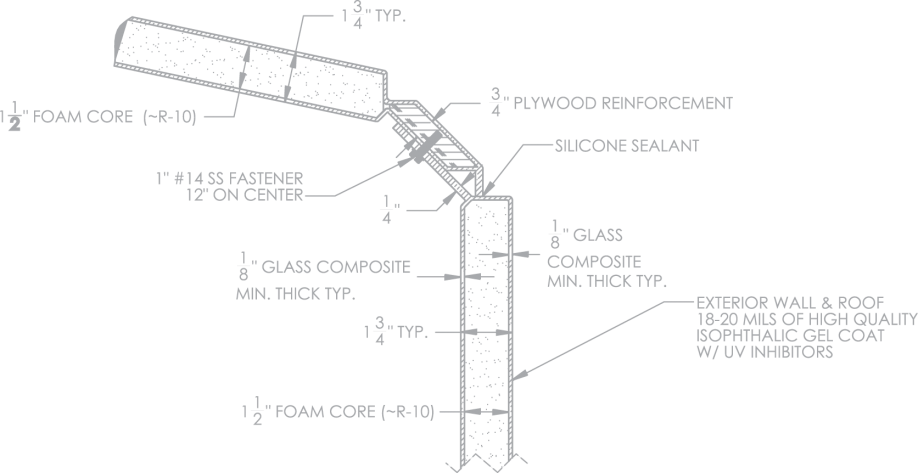Advanced Composites for Resilient and Lightweight Building
Advanced Composites for Resilient and Lightweight Building
Blog Article
Exploring the Uses and Advantages of Recycled Composites in Modern Industries
The amalgamation of recycled products with sophisticated composite modern technologies presents an appealing opportunity for improving sustainability, strength, and cost-efficiency across different markets. As sectors seek ingenious remedies to resolve ecological concerns and improve functional performances, the unification of recycled compounds arises as an engaging choice.
Ecological Benefits of Recycled Composites
The application of recycled composites in contemporary sectors supplies significant ecological advantages, contributing to the decrease of waste and the conservation of natural resources. By incorporating recycled composites into manufacturing processes, industries can decrease their reliance on virgin products, therefore decreasing the amount of waste generated and the energy needed for removal and manufacturing. This change in the direction of utilizing recycled composites aids in diverting materials from landfills, relieving the worry on waste management systems, and decreasing greenhouse gas discharges connected with conventional production techniques.
Additionally, the use of recycled compounds promotes the preservation of natural deposits such as wood, minerals, and water, which are frequently depleted via the extraction and handling of resources (composites). By extending the life-span of products through recycling, sectors can assist maintain ecosystems and biodiversity by lowering the demand for brand-new resources. Overall, the fostering of recycled composites in modern-day markets plays an essential role in promoting sustainability and alleviating the environmental influence of production procedures
Enhanced Durability in Item Manufacturing
With a concentrate on longevity and effectiveness, including recycled composites right into product production processes improves toughness and sustainability. By utilizing recycled composites, suppliers can produce items that are not only solid but additionally resistant to tear and put on, making them ideal for long-lasting usage in various sectors. The combination of various materials in recycled composites can often cause improved toughness and resilience contrasted to typical materials, providing an affordable option for generating lasting products.
Among the essential advantages of using recycled composites in product production is the capacity to tailor the product residential properties to meet particular toughness requirements. By readjusting the make-up and production techniques, producers can personalize the recycled composites to stand up to extreme ecological problems, hefty lots, or frequent use without endangering on efficiency. This adaptability in design and production enables the production of very sturdy items that keep their honesty over time, decreasing the requirement for regular replacements and eventually contributing to a much more lasting manufacturing process.
Cost-Effectiveness and Economic Benefits
Incorporating recycled compounds right into product manufacturing not only enhances longevity and sustainability however likewise supplies significant cost-effectiveness and economic benefits. Utilizing recycled composites can bring about reduced material expenses as recycled materials are frequently much find less pricey than virgin products. Additionally, reusing composite products can lower waste disposal costs and lower the demand for garbage dump room, adding to overall cost savings for markets.

Development and Style Flexibility With Recycled Compounds
Using recycled composites in modern-day sectors supplies unmatched chances for development and design versatility. By integrating recycled materials right into composite production processes, business can push the limits of traditional layout constraints and discover new opportunities. The adaptability of recycled composites permits the development of complex shapes and frameworks that may not be achievable with traditional materials.
One of the vital advantages of recycled compounds is their ability to be built into different forms, providing designers the freedom to explore unique forms and dimensions. composites. This versatility opens up a globe of creative chances, enabling the advancement of light-weight yet long lasting products that satisfy the details requirements of various industries
Moreover, making use of recycled composites promotes lasting techniques and supports the circular economy by lowering waste and minimizing the ecological influence of making composites procedures. This emphasis on environment-friendly layout solutions aligns with the growing pattern towards sustainability in modern-day sectors, making recycled composites an important resource for ingenious and forward-thinking business.
Applications Throughout Various Industries
Recycled composites locate impactful and diverse applications throughout a variety of industries due to their distinct homes and sustainability advantages. In the vehicle market, these products are significantly made use of for making long lasting and light-weight elements, improving fuel efficiency and minimizing carbon discharges. The aerospace market benefits from recycled composites in the production of aircraft parts, where the products' strength-to-weight proportion is critical for ensuring safety and efficiency. In construction, these compounds are made use of for producing strong yet environmentally friendly building materials, contributing to sustainable framework advancement. The renewable resource sector employs recycled compounds in wind generator blades and solar panels, using their stamina and resistance to severe environmental problems. Furthermore, the aquatic industry uses these products for producing watercraft hulls look at these guys and components, supplying enhanced resilience and corrosion resistance. The convenience and sustainability of recycled composites make them useful across different industries, driving development and environmental stewardship. composites.
Final Thought
To conclude, the application of recycled composites in contemporary sectors offers considerable environmental advantages, enhanced toughness in item manufacturing, cost-effectiveness, and economic advantages. Additionally, making use of recycled composites enables for advancement and layout flexibility throughout various sectors. Generally, the fostering of recycled compounds presents a sensible and lasting solution for meeting the needs of the market while additionally lowering ecological influence.

One of the crucial advantages of using recycled composites in item production is the capacity to tailor the product properties to fulfill certain resilience requirements. Making use of recycled composites can lead to reduced product costs as recycled products are often much less costly than virgin products. The aerospace market advantages from recycled composites in the manufacturing of aircraft components, where the materials' strength-to-weight proportion is important for ensuring safety and security and performance.
Report this page